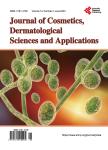Topical Application of Synbiotic Bacillus Preparations Positively Affects Skin (Micro) Biology
Topical Application of Synbiotic Bacillus Preparations Positively Affects Skin (Micro) Biology作者机构:The Laboratory for Biochemistry and Biotechnology of The Skin The Dead Sea & Arava Science Center Masada Israel HeiQ Chrisal Synbiotics R&D Centre Lommel Belgium BioInfoRx Inc. Madison USA
出 版 物:《Journal of Cosmetics, Dermatological Sciences and Applications》 (化妆品、皮肤病及应用期刊(英文))
年 卷 期:2023年第13卷第2期
页 面:107-123页
学科分类:1002[医学-临床医学] 100214[医学-肿瘤学] 10[医学]
主 题:Probiotic Cosmetics Skin Transcriptome Bacillus Ferment Polygonum Extract Acne Vulgaris Prebiotic Synbiotic Skin Cream
摘 要:Alteration in skin microbiome profile is involved in many skin conditions, therefore, microbiome modulation is a reasonable target for skin health. Probiotic skincare was suggested, and leave-on synbiotic skincare preparation, blending bacillus spores, as probiotic active ingredient, and inulin sugar, as prebiotic booster, is evaluated, using microarray, 16S gene sequencing, and clinical skin analyses. Topical application of leave-on synbiotic skincare on skin model activates a profound effect on skin biology, expressed in the transcriptome level, with higher than 10% affected genes. The significance of the synbiotic preparation on skin biology was assured, indicating the involvement of major biological pathways. Blending probiotic with Polygonum aviculare plant extract, had triggered a distinct gene expression alteration, demonstrating the sensitivity of skin responses to different active substances. A synbiotic skincare application, had successfully introduced live and active Bacillus probiotics on human skin, detectable days after application was finalized. Following synbiotic application, the microbial content of several microorganisms, related to skin pathologies, was reduced, while the content of bacillus species, representing a healthier microbiome status, was increased, suggesting that frequent application may lead to overall healthier skin microbiome. Acne vulgaris involves unbalanced skin microbiome, with expansion of Cutibacterium acnes. The efficacy of a synbiotic skin cream was assessed to improve acne symptoms, including IGA dermatologist acne severity score, the number of counted acne lesions, measured skin oiliness and skin redness, visual appearance of skin-pores, skin smoothness and softness, and Acne Quality of Life Index.



